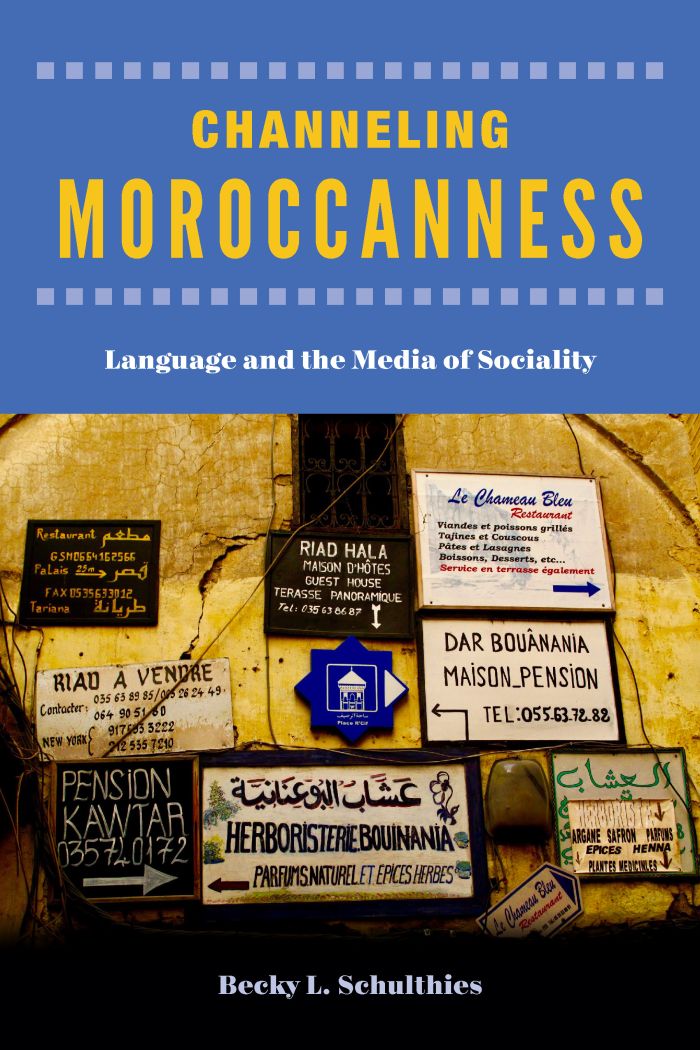Channeling Moroccanness
Language and the Media of Sociality

This book can be opened with

Honorable Mention, 2022 L. Carl Brown AIMS Book Prize in North African Studies
What does it mean to connect as a people through mass media? This book approaches that question by exploring how Moroccans engage communicative failure as they seek to shape social and political relations in urban Fez. Over the last decade, laments of language and media failure in Fez have focused not just on social relations that used to be and have been lost but also on what ought to be and had yet to be realized. Such laments have transpired in a range of communication channels, from objects such as devotional prayer beads and remote controls; to interactional forms such as storytelling, dress styles, and orthography; to media platforms like television news, religious stations, or WhatsApp group chats.
Channeling Moroccanness examines these laments as ways of speaking that created Moroccanness, the feeling of participating in the ongoing formations of Moroccan relationality. Rather than furthering the discourse about Morocco’s conflict between liberal secularists and religious conservatives, this ethnography shows the subtle range of ideologies and practices evoked in Fassi homes to calibrate Moroccan sociality and political consciousness.
In Channeling Moroccanness, Becky Schulthies challenges anthropological linguistics by pushing beyond the speech event to different contexts of speaking, listening, and viewing to come up with what she calls a ‘calibration’ of Moroccan sociality. The book is an important and distinctive contribution to the ethnography of Morocco.—Steven Caton, Harvard University
Channeling Moroccanness is highly readable and brisk. Schulthies’s intimate descriptions of timely media practices and Moroccans’ discussions of their effects contribute important ethnographic detail on the weaving of technological media into everyday communications and evince her extensive ethnographic labor. This is a vital and compelling book.—Emilio Spadola, Colgate University
[An] analytically sophisticated attemptby a sociolinguist to reveal how a group of urban Moroccans critically use different linguistic channels to confirm their identity and reestablish their connectedness as fellow Moroccans. Recommended.—Choice
...Channeling Moroccanness offers a welcome intervention into what can often be stale and binary debates about language, religion, identity, and politics in the contemporary Maghrib. It also offers an innovative way of conceptualizing and studying national identities and national publics through the lens of lament and communicative failure. Perhaps most importantly, it offers a subtle sense of hope for the possibility of social connection to exist despite, or perhaps even because of fractures.—The Middle East Journal
...this work offers a revised conceptualization of what listening, speaking, reading, and writing are, and what they do. It also offers a rich analysis of media channels as they structure sociality and makes one wonder if anyone can read a text without hearing it. Ultimately, Schulthies’ work productively blurs linguistic categorization and considers the full spectrum of multimodal communicative practice.—Language in Society
Note on Transcription and Translation | ix
Introduction: Moroccan Channels, Channeling Moroccanness | 1
1 A Fassi Linguascape | 37
2 Literate Listening: Broadcast News and Ideologies of Reasoning | 43
3 Reregistering Media and Remediating a Register: Moroccan Morality Tales | 73
4 Scripting Sounds and Sounding Scripts: Senses, Channels, and Their Discontents | 102
5 Mediating Moroccan Muslims | 137
Conclusion: Opening and Closing the Channels | 169
Appendixes | 175
Acknowledgments | 189
Notes | 191
Bibliography | 203
Index | 219




